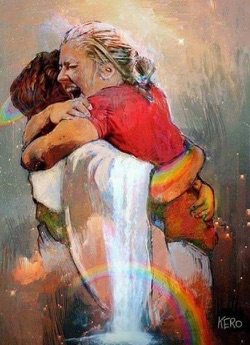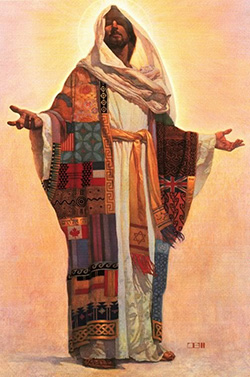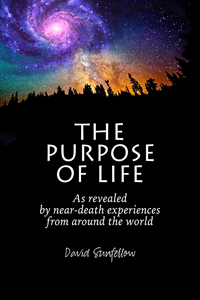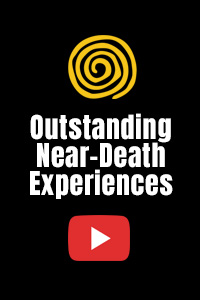![]()
 Dr. George G. Ritchie, M.D. (born September 25, 1923; died October 29, 2007) held positions as president of the Richmond Academy of General Practice; chairman of the Department of Psychiatry of Towers Hospital; and founder and president of the Universal Youth Corps, Inc. for almost 20 years. In 1967, he entered private psychiatry practice in Richmond and in 1983, moved to Anniston, Alabama, to serve as head of the Department of Psychiatry at the Northeast Alabama Regional Medical Center. He returned to Richmond in 1986 to continue in private practice until retirement in 1992. At the age of twenty, George Ritchie died in an army hospital and was pronounced dead twice by the doctor on duty. Nine minutes later he returned to life. Dr. Ritchie wrote of his near-death experience (NDE) in Return from Tomorrow, co-written with Elizabeth Sherrill, in 1978. In Return from Tomorrow, he tells of his out-of-body experience, his meeting with Jesus Christ, and his travel with Christ through different dimensions of time and space. Return from Tomorrow has been translated into nine languages. Ritchie’s story was the first contact Dr. Raymond Moody, PhD had with NDEs, during his undergraduate studies in philosophy at the University of Virginia. This led Moody to investigate over 150 cases of NDEs in his book Life After Life and two other books that followed.
Dr. George G. Ritchie, M.D. (born September 25, 1923; died October 29, 2007) held positions as president of the Richmond Academy of General Practice; chairman of the Department of Psychiatry of Towers Hospital; and founder and president of the Universal Youth Corps, Inc. for almost 20 years. In 1967, he entered private psychiatry practice in Richmond and in 1983, moved to Anniston, Alabama, to serve as head of the Department of Psychiatry at the Northeast Alabama Regional Medical Center. He returned to Richmond in 1986 to continue in private practice until retirement in 1992. At the age of twenty, George Ritchie died in an army hospital and was pronounced dead twice by the doctor on duty. Nine minutes later he returned to life. Dr. Ritchie wrote of his near-death experience (NDE) in Return from Tomorrow, co-written with Elizabeth Sherrill, in 1978. In Return from Tomorrow, he tells of his out-of-body experience, his meeting with Jesus Christ, and his travel with Christ through different dimensions of time and space. Return from Tomorrow has been translated into nine languages. Ritchie’s story was the first contact Dr. Raymond Moody, PhD had with NDEs, during his undergraduate studies in philosophy at the University of Virginia. This led Moody to investigate over 150 cases of NDEs in his book Life After Life and two other books that followed.
………………
A Summary of Dr. George Ritchie’s Near-Death Experience
Near-Death.com
 In December, 1943, George Ritchie died of pneumonia. Nine minutes later, miraculously and unaccountably, he returned to life to tell of his amazing near-death experience in the afterlife. His near-death experience was the one that profoundly moved Raymond Moody to begin seriously investigating the near-death experience. Since Dr. Moody is considered to be the “father of the near-death experience,” Dr. Ritchie’s near-death experience is in a class of its own. You will find his experience to be one of the most profound near-death experiences ever documented.
In December, 1943, George Ritchie died of pneumonia. Nine minutes later, miraculously and unaccountably, he returned to life to tell of his amazing near-death experience in the afterlife. His near-death experience was the one that profoundly moved Raymond Moody to begin seriously investigating the near-death experience. Since Dr. Moody is considered to be the “father of the near-death experience,” Dr. Ritchie’s near-death experience is in a class of its own. You will find his experience to be one of the most profound near-death experiences ever documented.
The following is a brief summary of Dr. George Ritchie’s near-death experience. You can read his NDE testimony in its entirety in his ground-breaking books Return From Tomorrow and his follow-up book Ordered to Return: My Life After Dying.
George leaves his body and sees it lying in his bed. He is not aware the dead body in his bed is his. Wanting eagerly to travel to Richmond, Virginia to start college, he finds himself flying in the air toward a city. He is not sure how he acquired these strange powers of flight and transparency. He arrives at a city and discovers he has lost his solidness. He flies back to the hospital and sees his lifeless body in the morgue and realizes he has died.
Suddenly, Jesus appears emitting a tremendous light and love. George’s entire life appears before him. Jesus asks, “What have you done with your life?” He realizes Jesus is not judging him, but he is judging himself.
Jesus gives him a tour of four different dimensions in the afterlife. They both fly toward a large city on Earth where they notice a group of assembly-line workers at work. He witnesses the spirit of a woman trying desperately to obtain a cigarette from the workers who are oblivious to her presence. This woman died severely addicted to cigarettes.
In a house, Jesus shows him the spirit of a boy following a living teenage girl and begging for forgiveness while the girl is completely unaware of the boy’s presence. Jesus tells George that the boy committed suicide and is “chained to every consequence of his act.”
Jesus shows George a bar filled with sailors who are heavily drinking. Spirits try desperately and in vain to get a drink or to control the sailors’ alcoholic behavior. These spirits are from humans who die severely alcoholic. He is horrified as he observes a drunken sailor pass out and an alcoholic spirit jump into the body of the sailor.
Jesus takes him to a new dimension away from Earth and shows him a kind of “receiving station” where spirits would arrive in a deep hypnotic sleep because of their beliefs. These are spirits who believe they must sleep after death until Jesus returns.
Jesus shows him a dimension where angry spirits are locked in hand-to-hand combat, trying in vain to hurt each other. He hears verbal abuse going on. He observes some trying in vain to get sexual gratification from each other. He also sees spirits arguing over some religious or political point and trying to kill the ones who did not agree with them. Here, he realizes he is seeing hell. These are spirits who are locked into some earthly desire that went beyond the physical and which cannot be satisfied in the spirit.
He is then taken to a different dimension appearing like an enormous university. Here he observes people dressed as monks engaged in some form of artistic behavior or research. He is taken into an enormous library where all the important books of the universe are assembled. He asks Jesus if this is heaven. He replies that these are the people who grew beyond selfish desires while on Earth. George realizes these people cannot see Jesus, just as the others could not see him in hell.
Jesus takes him into outer space toward a distant city made of brilliant light of a similar description to the city in the Book of Revelation. He speculates this is the place where people go who have become Christ-like while on Earth. Here, love was the dominant focus of life. He realizes he is seeing heaven, but he is not allowed to go in. Jesus then shows him the future of the Earth. He then returns to his physical body.
………………
Excerpt from “Return from Tomorrow”:
 “The plain was crowded, even jammed with hordes of ghostly discarnate beings; nowhere was there a solid, light-surrounded person to be seen. All of these thousands of people were apparently no more substantial than I myself. And they were the most frustrated, the angriest, the most completely miserable beings I had ever laid eyes on.
“The plain was crowded, even jammed with hordes of ghostly discarnate beings; nowhere was there a solid, light-surrounded person to be seen. All of these thousands of people were apparently no more substantial than I myself. And they were the most frustrated, the angriest, the most completely miserable beings I had ever laid eyes on.
“‘Lord Jesus!’ I cried. ‘Where are we?’
“At first I thought we were looking at some great battlefield: everywhere people were locked in what looked like fights to the death, writhing, punching, gouging. It could not be a present-day war because there were no tanks or guns. No weapons of any sort, I saw as I looked closer, only bare hands and feet and teeth. And then I noticed that no one was apparently being injured. There was no blood, no bodies strewed the ground; a blow that ought to have eliminated an opponent would leave him exactly as before.
“Although they appeared to be literally on top of each other, it was as though each man was boxing the air; at last I realized that of course, having no substance, they could not actually touch one another. They could not kill, though they clearly wanted to, because their intended victims were already dead, and so they hurled themselves at each other in a frenzy of impotent rage.
“If I suspected before that I was seeing hell, now I was sure of it. Up to this moment the misery I had watched consisted in being chained to a physical world of which we were no longer part. Now I saw that there were other kinds of chains. Here were no solid objects or people to enthrall the soul. These creatures seemed locked into habits of mind and emotion, into hatred, lust, destructive thought patterns.
“Even more hideous than the bites and kicks they exchanged were the sexual abuses many were performing in feverish pantomime. Perversions I had never dreamed of were being vainly attempted all around us. It was impossible to tell if the howls of frustration that reached us were actual sounds or only the transference of despairing thoughts. Indeed in this disembodied world it did not seem to matter. Whatever anyone thought, however fleetingly or unwillingly, was instantly apparent to all around him, more completely than words could have expressed it, faster than sound waves could have carried it.
“And the thoughts most frequently communicated had to do with the superior knowledge, or abilities, or background of the thinker. ‘I told you so!’ ‘I always knew!’ ‘Didn’t I warn you!’ were shrieked into the echoing air over and over. With a feeling of sick familiarity I recognized here my own thinking. This was me, my very tone of voice — the righteous one, the award-winner, the churchgoer. At age twenty I had not yet developed any truly changing physical habits, not like the beings I had seen scrabbling to get close to that bar. But in these yelps of envy and wounded self-importance I heard myself all too well.
“Once again, however, no condemnation came from the Presence at my side, only a compassion for these unhappy creatures that was breaking His heart. Clearly it was not His will that any one of them should be in this place.
“Then — what was keeping them here? Why didn’t each one just get up and leave? I could see no reason why the person being screamed at by that man with the contorted face did not simply walk away. Or why that young woman did not put a thousand miles between herself and the other one who was so furiously beating her with insubstantial fists? They could not actually hold on to their victims, any of these insanely angry beings. There were no fences. Nothing apparently prevented them from simply going off alone.
“Unless . . . unless there was no ‘alone’ in this realm of disembodied spirits. No private corners in a universe where there were no walls. No place that was not inhabited by other beings to whom one was totally exposed at all times. What was it going to be like, I thought with sudden panic, to live forever where my most private thoughts were not private at all? No disguising them, no covering them up, no way to pretend I was anything but what I actually was. How unbearable. Unless, of course, everyone around me had the same kind of thoughts. Unless there was a kind of consolation in finding others as loathsome as one’s self, even if all we could do was hurl our venom at each other.
“Perhaps this was the explanation for this hideous plain. Perhaps in the course of eons or of seconds, each creature here had sought out the company of others as pride-and-hate-filled as himself, until together they formed this society of the damned.
“Perhaps it was not Jesus who had abandoned them, but they who had fled from the Light that showed up their darkness. Or, were they as alone as at first it appeared? Gradually I was becoming aware that there was something else on that plain of grappling forms. Almost from the beginning I had sensed it, but for a long time I could not locate it. When I did it was with a shock that left me stunned.
“That entire unhappy plain was hovered over by beings seemingly made of light. It was their very size and blinding brightness that had prevented me at first from seeing them. Now that I had, now that I adjusted my eyes to take them in, I could see that these immense presences were bending over the little creatures on the plain. Perhaps even conversing with them.
“Were these bright beings angels? Was the Light beside me also an angel? But the thought that had pressed itself so undeniably on my mind in that little hospital room had been: You are in the presence of the Son of God. Could it be that each of these other human wraiths, wretched and unworthy like me, was also in His presence? In a realm where space and time no longer followed any rules I knew, could He be standing with each of them as He was with me?
“I did not know. All I clearly saw was that not one of these bickering beings on the plain had been abandoned. They were being attended, watched over, ministered to. And the equally observable fact was that not one of them knew it. If Jesus or His angels were speaking to them, they certainly did not hear. There was no pause in the stream of rancor coming from their own hearts; their eyes sought only some nearby figure to humiliate. It would have seemed to me impossible not to be aware of what were the hugest and most striking features of that whole landscape, except that I myself had stared at them unseeing.
“In fact, now that I had become aware of these bright presences, I realized with bewilderment that I had been seeing them all along, without ever consciously registering the fact, as though Jesus could show me at any moment only so much as I was ready to see. Angels had crowded the living cities and towns we had visited. They had been present in the streets, the factories, the homes, even in that raucous bar, where nobody had been any more conscious of their existence than I myself had.
“And suddenly I realized that there was a common denominator to all these scenes so far. It was the failure to see Jesus. Whether it was a physical appetite, an earthly concern, an absorption with self — whatever got in the way of His Light created the separation into which we stepped at death.”
— NDEr Dr. George Ritchie, Return from Tomorrow (pp. 78-79)








